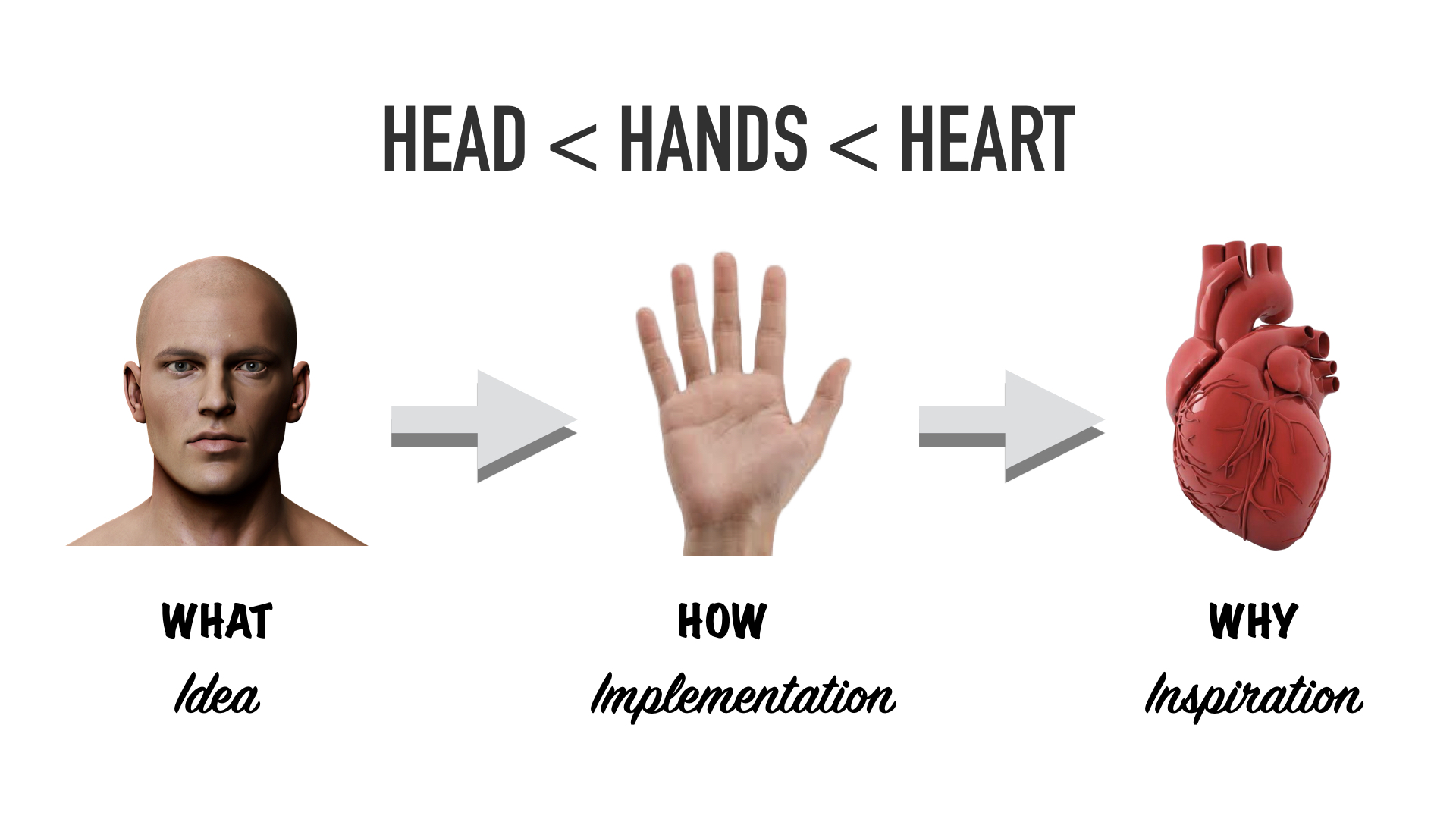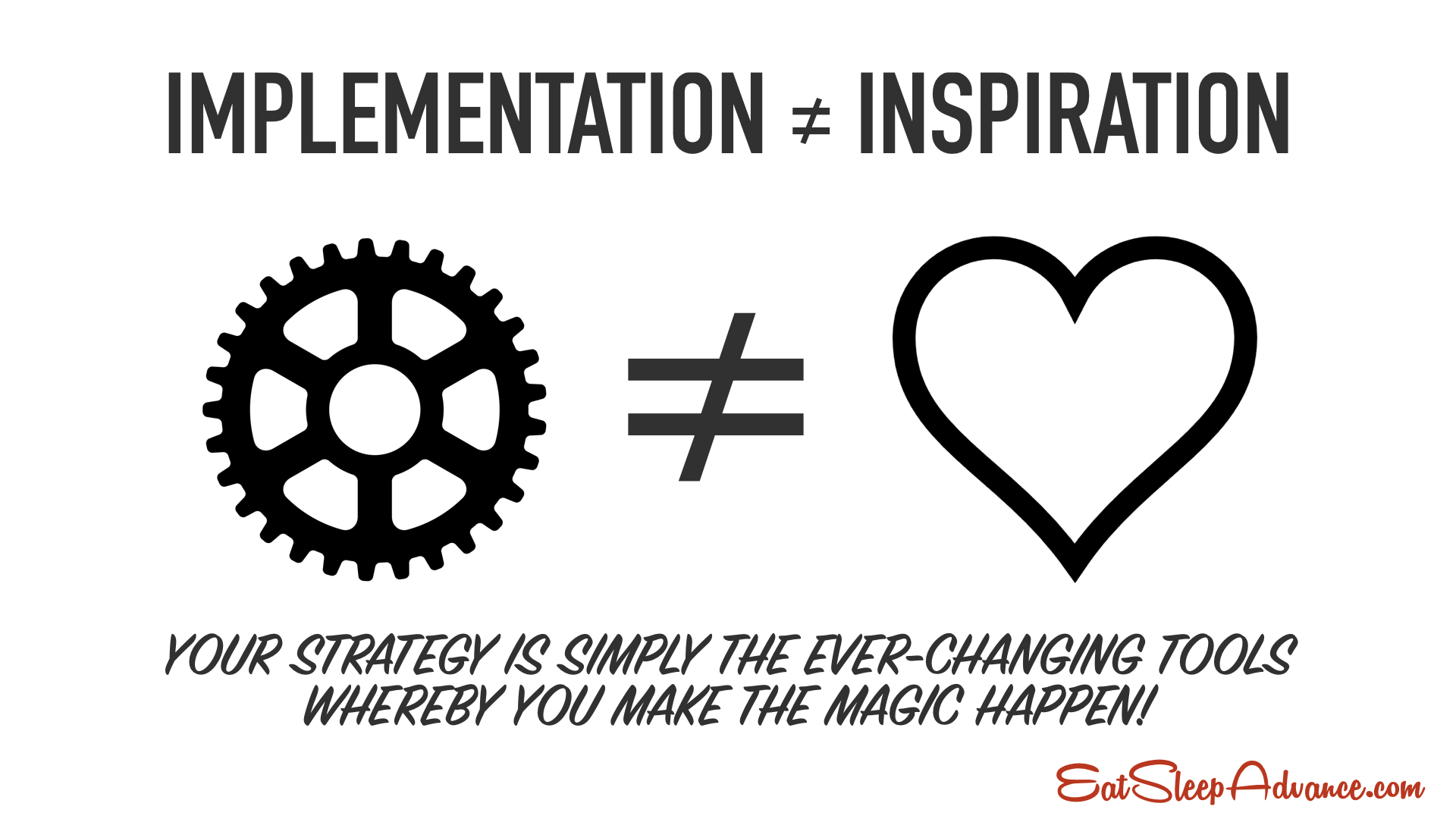Video: When you confuse your heart with your hands, you lose your way
Here’s what happens when you lose your “why”- you confuse the implementation strategy with your reason for having a strategy in the first place.
Let me explain…
At the Advance we teach that the best dreams all have a few elements:
- The WHAT- actually defines the dream. It describes where we are now and where we want to be in the future. The WHAT is the goal…
- The HOW- is the implementation strategy. It’s the MEANS we use to accelerate towards and achieve the WHAT.
- The WHY- is the reason we do it all… it’s the thing that drives us, that motivates us to move towards that preferred future rather than remaining where we are.
Here’s what it looks like (notice that each corresponds with either your head, your hands, or your heart… because it’s either an IDEA, an IMPLEMENTATION, or the INSPIRATION):

Confusion with your "why"
A lot of people get confused about their why. In fact, it’s kinda mind-boggling how confusing it is each time we teach it (we’ve taught this for about 2.5 years, now, and the same confusion exists each time new guys attend our events).
The confusion comes from three places, IMO.
Confusion-Creator #1: The term “What is your why?” is over-used
I literally hear this questions at every single business conference I attend.
The result? It’s commonplace to hear about it without actually thinking about it.
Now, it’s actually a positive thing that people are having the conversation. However, no one consistently defines what that term means. As such, it’s easy to end up with shallow, surface answers
Confusion-Creater #2: We (rightly) have several “whys”
There may not be JUST ONE over-arching reason that you’re pursuing your dream. For instance, my bent towards fitness and health is because I want to maintain my weight (I used to be 50 pounds heavier) AND I want to be able to keep up with the sons when they get older and begin running, lifting weights, and being more physically active. Those are two DIFFERENT reasons for pursuing the same goal.
Add this to the fact that most of us are pursuing multiple dreams…
- We have business goals.
- We have things we’d like to see happen in our marriage, in our family, and in other significant relationships.
- We have hobbies and skills we’d like to develop.
You may have a “bag” of whys- instead of just one “why,” in other words.

Again, you might have a different driving value (a different "why") for each dream (i.e., your core reason for pursuing a profitable business may be different than your reason for pursuing heath and fitness, which may be different than your reason for learning to play the guitar or learn a foreign language, etc.).
Confusion-Creator #3: Your why may change- and that’s OK
The fact is that seasons change, and our priorities shift. The things that drove us to do something in the beginning sometimes become irrelevant. In other words, the “why” can actually morph.
An example…
Cristy started working her home-based essential oil biz just to “get her products for free” (sell enough to pay make just enough $$$ to pay for her own products). She enjoyed what she was doing and had a bit of success, so she thought about what the “next level” of potential might look like.
She continued growing her business to have additional money to pay for things we needed to do as a family but couldn’t afford while we were living “paycheck to paycheck” (i.e., both of our girls needed braces- we paid cash in back-to-back months).
Do you see what happened? Yeah- her “why” changed.
As we saw the income potential, we knew her business could bring us financial freedom. So, we continued pursuing growing in the business. I eventually stepped away from my full time job in order to work from home with her.
In addition, we also enjoy working together- and dreamed of doing so for a long time.

A warning: understanding your "why" keeps you relevant
People (and organizations) who don't know their “why" often confuse the "how" with the why. That is, the application (how they do something) becomes the inspiration- to their detriment. Understanding your "why" keeps you RELEVANT.
I grew up in the Church. It’s no secret that attendance at traditional churches is in decline. 3,000-plus churches close every single year. In fact, the amazing church where I was raised… well… a few months ago, it closed. It happens to the best of them.
In church world, it’s common to hear the phrase “We don’t do it that way."
Or, “We do it like this, because it's the way we’ve always done it.”
The exact phrase may change, but the sentiment is the same: the methods we use (read: the implementation strategy) is king. They're sacred. Don’t mess with them.
In other words, any of those phrases are a tell-tale sign that people have confused the HOW with the WHY. They’ve put the cart before the horse. They’ve decided to let the tail wag the dog.
Churches aren’t the only ones to do this. In fact, history is full of companies and industries that got this wrong.

Here are four examples of industries that let the hands outstrip the heart in terms of influence:
Example 1: Railroad companies were once the leaders in the transportation business- not the “track” business. If they understood this, is it possible Amtrak, CSX, or other companies might have been the first to own airplanes?
Think about it. They had the market share. They had the capital. They had name-recognition. They even had the equipment, the man-power, and the best technology of the day.
But…
Well, it’s hard to teach old dogs new tricks, right?
Example 2: Newspapers shared late-breaking news and current ideas with the masses for decades. Centuries, even. However, the publishers became tied to their delivery method (a “how,” by using actual ink on printed paper). In doing so, they lost their purpose- their “why.” They could have pioneered the Internet, which is now the “go to” strategy everyone uses to gather late-breaking news.
Newspapers, though, were late adopters to online technology. Today, cities are full of abandoned office buildings that once houses huge “papers.” And it’s not that we need less writers and less researchers, it’s just that… well… we need less of them putting their findings in print. We need it in “pixel” instead.
Example 3: Music labels delivered portable sound experiences for years. Interestingly enough, they made the transition from records, to 8-tracks, to cassettes, to CDS….
But- here’s the whammy- they were attached to physical products you purchase in actual stores.
There’s practically no reason iTunes should exist today. In fact, the early days, Steve Jobs actually had to work his magic and do some convincing in order to get them to adopt a new way of delivering music across the Internet in downloadable form.
Turned out, he was on to something. And, whereas record stores were popular when I was in high school. Today, it’s hard to find one. Anywhere.
What happened? Many of the players in the music industry confused their purpose with the packaging (or, they confused their “why” with their “how” and “what”).
A final example…
Example 4: The television networks delivered entertainment to people in their homes. Most of it… was free, though we’re certainly willing to pay for premium services.
At some point, the industry forgot that they were delivering entertainment as a convenience to the people, though. As new entries to the market began allowing us to choose when we watched our favorite shows (i.e., Netflix, Apple TV, YouTube, Vimeo, & Hulu), more and more people began taking advantage of the scheduling options…
In addition, other consumers thought, “Hmmm… I don’t only want to watch TV ion the screen in my home… I also want to watch on my laptop… or on my phone… Yes, I want to watch it wherever I want to watch it… and whenever I want to….”
In less than a decade, the Big 3 networks moved from their position of leadership in the industry. Who would ever have thought that Netflix and Amazon would win awards that used to be reserved for shows exclusively from the power 3 networks? Who would have thought that big name movie stars would shoot straight-to-living-room-batch-release "TV shows" for Netflix?

Lessons from the trenches
A few years ago our essential oil business took a hit. We faced some unique family issues that needed a lot of time and attention, we faced some market conditions that were unfavorable, and we had some team members who just gave up and quit. It was the perfect storm.
I learned a bit about the “why” amidst all of this, though. Here’s how: For years we’ve taught that Young Living (our biz) is “an essential oil company.” And it is. IMO, it’s the best in the world.
But, pitching the company as only an essential oil company created the following dilemmas:
- We limited the scope of what we do.
- FDA compliance issues or other market changes that are out of our control radically impacted us, easily derailing our growth for a season, and cause us to have to redraw our business plans (anyone else experience this one?!).
- We ignored the vast inventory we have. And, we automatically, unknowingly close doors that would otherwise be open to us (i.e., gyms that would use our supplements, cleaning companies that would use our Thieves line, and restaurants that might want healthy wheat alternatives, salons and spas that want beauty products, etc.).
Reframing ourselves as “a wellness company” (a purpose, a “why”) suddenly creates the opportunities- even though the “what” hasn’t changed. Suddenly…
- Exercise & nutrition are more in view.
- Vitamins & supplements can suddenly lead a business- for you or one of your team members.
- Health & beauty products can take front & center position.
- Chemical-free / toxic-free homes can be a focus (as can hotels, businesses, schools, and daycare centers).
You see? We'd even let the implementation strategy (sell oils) blur the inspiration (get health + help people walk in health and healing).

Questions to make it practical
If you maintain relevance by leading with the inspiration ( why) instead of the application (how), then think…
What might you do differently as your children grow + mature- if your “why" is to train them in the way they should go…? If your mission as a parent is to always empower your children (a why), the strategy will simply look different at each stage of life- but, you can STILL empower them :-)
What if it’s a different “why”? In a different area of life?
How do things change if your drive (read: your “why”) is to empower someone working beneath / behind / below you in your business organization to become the best leader they can be? What happens when their skill set surpasses yours?
How might technology cause adjustments in your work? Can your “why” remain consistent?
Where have you seen organizations and/or people confuse application with inspiration and lose their relevance?
Conclusion + takeaway
Your heart tells you WHY you do things; your hands actually DO them... It's easy, though, to find yourself in a rut, stuck in a routine, mindlessly grinding away. When that happens, If you're not careful, you might confuse HOW you're doing something with the REASON itself....
Yet, in the end, the heart is always greater. Lead + live from there.

The Daily
Grace-infused e-votionals full of hope + practical wisdom delivered to your inbox early every morning.


